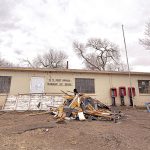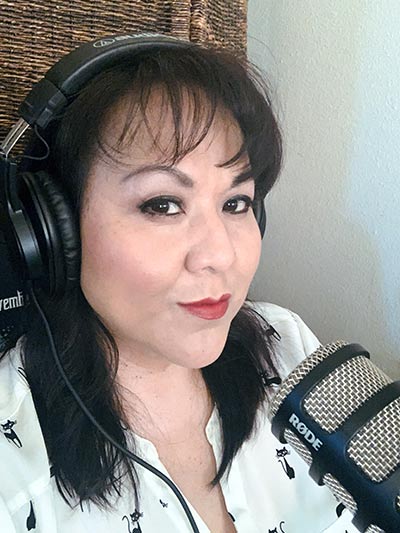
Podcaster reassures listeners they’re not alone
By Stacy Thacker
Special to the Times
SAULT STE. MARIE, Mich.
With the soothing crackling of fire and the subtle beat of a drum, listeners are welcomed into the “Real Native Roots: Untold Stories” podcast.

SUBMITTED
Vickie Oldman
The podcast was created by Vickie Oldman in 2019 and is a solo project. She refers to the podcast as her “love project.” “What’s beautiful about this podcasting is it’s about story,” she said, and its ability to heal. “Hopefully the listeners are feeling some of that healing,” she said, “that they realize they’re not alone that a lot of us have similar experiences, similar thoughts.” Stories are something Oldman has always held close.
She remembers asking her grandma and mom all the time to tell her stories. Sometimes she wanted to hear the same one over and over again. Her grandmother called her “Girl with Many Questions.”
Whether it’s in the hogan or sitting at the table with family, Oldman believes that listening and storytelling are part of the culture. “Diné people have been taught to listen and to hear the stories,” she said, adding that stories provide lessons later in life. While her grandma rarely denied her a story while growing up, there were times when she would hold back, telling Oldman that she wasn’t ready to hear a specific story.
At the time Oldman didn’t understand. “But now that I’m an older woman, I understand what she meant because even if she told me the story, I don’t know if I would have been at that point in my life to understand the true wisdom of it,” she said.
It wasn’t until Oldman experienced life that she was able to reflect on some of her grandma’s stories and the teachings attached to them. The power of stories is something Oldman wanted to share through podcasts.
Every month she has a new guest and the topics are endless. Oldman’s goal is to let the conversations happen naturally. She tried to pick themes and stay strictly on topic but after interviewing her mom, Oldman learned that people’s life stories can’t be forced into 30-minute segments.
“It really provides this gift of being fully present,” Oldman said of the podcast. “It’s an opportunity to hold sacred space with each other.”
Being too much in the past or future causes stress and anxiety, she said. Her podcast brings a balance to her life. It takes Oldman about 12 to 15 hours to work on an episode. She is self-taught and listens to interviews up to four times before posting to make sure the limited edits are correct and the quality is good.
“Every time I listen, I catch something I didn’t catch before,” she said. Her guests range from personal acquaintances to Native Americans helping their communities. She hopes the experience is educational as well as entertaining. “I think it helps people who don’t understand our Indigenous people and how we came to be,” she said. “I’d rather have our people tell their own stories. I think that’s important.”
The podcast is also a way for Oldman to help collect data, history and hopefully inspire as well as spark possibility. She wants to record stories and protect them for future generations. “We are all a continuum of stories from our ancestors, our grandparents, our parents,” she said, adding the thread continues with children and it’s important to hold on to what we can for them.
When the pandemic hit, Oldman had to rely on Zoom and good cell phone service on the reservation to keep preserving stories. But the obstacles didn’t change the quality of the interviews or the connections she made with each guest.
Her podcast has listeners from across the country, in Canada, China, Australia and one in Morocco.
Oldman hopes to make podcasts a full-time job but for now she’s OK spending what little free time she has working on episodes, which can be found on Spotify, Google, Apple, Amazon or at the website realnativeroots.com.








 Highway 264,
Highway 264, I-40, WB @ Winslow
I-40, WB @ Winslow